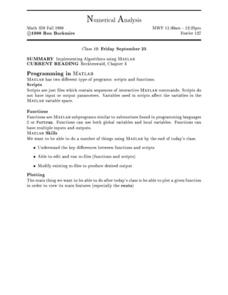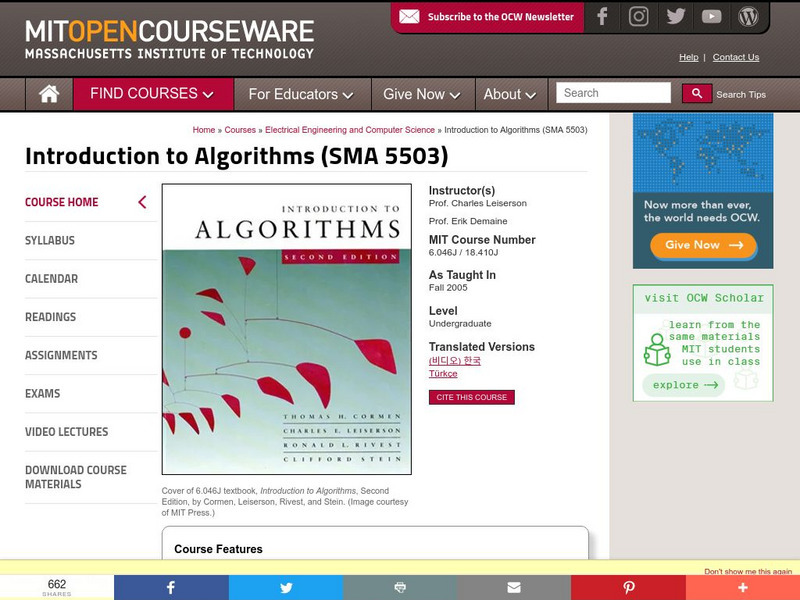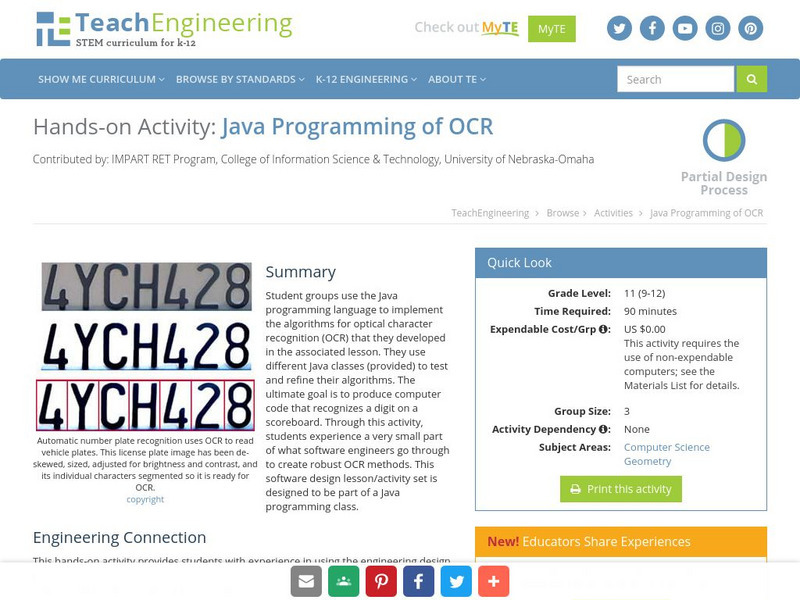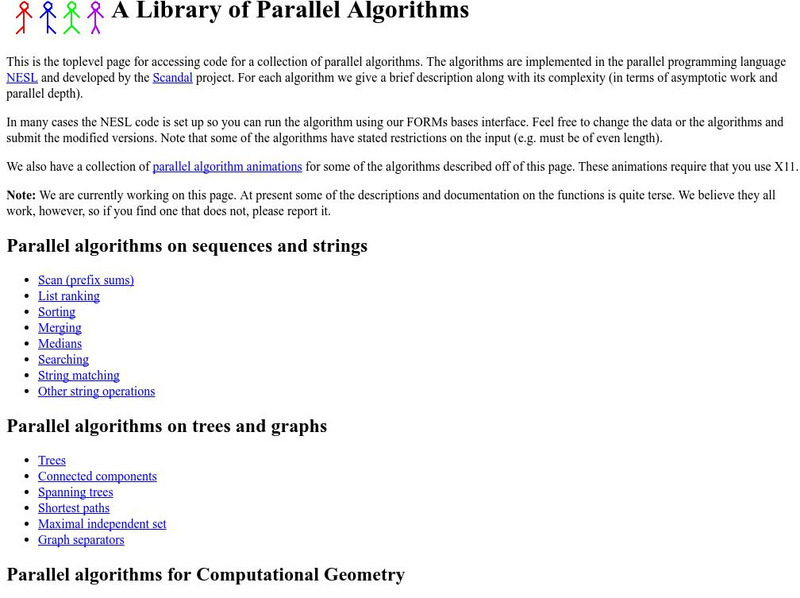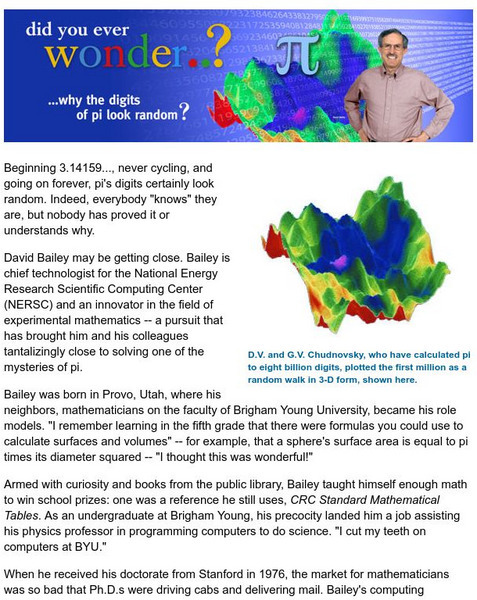Curated OER
Numerical Analysis
In this math learning exercise, students examine the concepts of generalizing root-finding algorithms and fixed point iteration. They also practice using the Fixed Point Theorem.
Curated OER
Numerical Analysis
In this math worksheet, students practice analyzing root finding algorithms, Newton-Raphson and secant. They use the examples to master the concepts.
Curated OER
Numerical Analysis/ Introduction to Algorithms and Pseudocode
In this math activity, students examine the concepts of algorithms and pseudocodes. Then they use the codes on a computer to execute the algorithms.
Curated OER
Implementing Algorithms Using Matlab
In this math worksheet, students practice implementing algorithms using the computer program of Matlab. They practice using the programs of scripts and functions.
Curated OER
Learning To Use Matlab Interactively
In this math worksheet, students explore the uses for the computer program of Matlab. They use the basic functions of the program to execute algorithms.
Curated OER
Numerical Analysis: Analyzing Root Finding Algorithms
For this root finding worksheet, students compare graphs and shade in regions corresponding to given convergence criteria. They compute the solution of equations of one variable. This two-page worksheet contains six problems.
Curated OER
The Multiplier (origin of the algorithm)
Learners explore basic algorithms for addition, subtraction, and multiplication. They use models to demonstrate solving two-digit by two-digit multiplication. Students demonstrate vertical formats to solve multiplication problems.
Curated OER
Egyptian Multiplication
Students examine the Egyptian method of multiplication and independently multiply any two numbers using the Egyptian algorithm.
Curated OER
Multiplication
Sixth graders play the game "MultipliACTION," where they use a standard algorithm to multiply numbers. They use the website Mathfrog and select "MultipliACTION." Students fill in the answer boxes, from right to left, top to bottom, or...
Curated OER
Going with the Flow
Students survey each other and determine their common interests. They examine the use of algorithms by various websites that are used to develop networks of interest groups among users. They then design proposals for a social networking...
Massachusetts Institute of Technology
Mit: Open Course Ware: Introduction to Algorithms
A complete course on algorithms presented at the college undergraduate level. The course includes video lecture, course materials, assignments and exams. Answer keys are provided for all assignments and exams.
Science Buddies
Science Buddies: Image Compression vs. Image Quality: Finding the Best Tradeoff
In this project you'll learn about how digital image files are encoded, and compressed. You will also measure the quality of compressed and uncompressed images, which will give you important insights into the tradeoffs between file size...
Other
University of Birmingham: "Top Down" and "Bottom Up" Design
Describes bottom-up design methodology and differentiates it from top-down procedures. Contains some questions to help choose a particular methodology.
Other
The Stony Brook Algorithm Repository
A comprehensive collection of algorithm implementations for fundamental problems in combinatorial algorithms. Provides algorithms for common programming problems. It also provides pointers on how to implement those algorithms in various...
TeachEngineering
Teach Engineering: Java Programming of Ocr
Student groups use the Java programming language to implement the algorithms for optical character recognition (OCR) that they developed in the associated lesson. The ultimate goal is to produce computer code that recognizes a digit on a...
TeachEngineering
Teach Engineering: Do You See What I See?
Students research OCR and OCR techniques and then apply those methods to the design challenge by developing algorithms capable of correctly reading a number on a typical high school sports scoreboard.
Khan Academy
Khan Academy: Expressing an Algorithm
Practice computer science problems expressing algorithms.
REMC Association of Michigan
Remc Association of Michigan: 21 Things4 Students: 21. Computational Thinking
Computational thinking can be used to take a complex problem, understand what the problem is and develop possible solutions to solve or explain it. In these six Quest, students will learn about the four stages of computational thinking:...
Carnegie Mellon University
Carnegie Mellon: A Library of Parallel Algorithms
A page for accessing code for a collection of parallel algorithms.The algorithms are implemented in the parallel programming language NESL and developed by the Scandal project. There is a brief description along with its complexity (in...
Lawrence Berkeley National Laboratory
Berkeley Lab: Did You Ever Wonder? Why the Digits of Pi Look Random?
Students investigate the randomness of the digits of pi. The article discusses David Bailey, experimental mathematics, and numerical algorithms. The resource consists of pictures, quotes, and links to additional resources.
TED Talks
Ted: Ted Ed: Kevin Slavin: How Algorithms Shape Our World
In this fascinating talk, Kevin Slavin argues that we're living in a world controlled by algorithms which determine: espionage tactics, stock prices, movie scripts, and architecture. He warns us that we are writing code we can no longer...
Science Buddies
Science Buddies: Digital Image Processing
Students who are mathematically inclined can use the student version of a program like MatLab or Mathematica to convert a digital image into numbers, then perform operations such as sharpening or special effects. This is a great way to...
Science Buddies
Science Buddies: Image Compression
Compare the strengths and weaknesses of different digital image formats. How does the amount of compression affect a JPEG image? What happens when you save a JPEG image multiple times?
University of Hawai'i
University of Hawaii: Bubble Sort
This page explains how a bubble sort works along with examples and source code.





